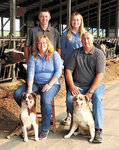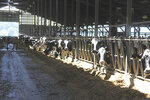CLINTONVILLE, Wis. – A great story has many layers and involves many characters and takes a while to weave. That is exactly the recipe that has created Triple D Dairy LLC in Clintonville.
Triple D Dairy is home to David and Connie Viergutz and their children, Jacob and Erin. The farm will be honored at this year’s Wisconsin State Fair as a sesquicentennial farm to celebrate 150 years of being home to members of the Viergutz family.
David is the fifth generation of his family to milk cows on the farm, and Jacob has joined the farm operation as the sixth generation after graduating from Fox Valley Technical College.
“I grew up doing it, and I never really wanted to do anything else,” David said.
To celebrate with their community, the Viergutzes are hosting the Shawano County Brunch on the Farm June 26 from 8:30 a.m. to 12:30 p.m.
Connie said the family has hosted the brunch two other times, back in 1989 and then in 2006.
“We’ve always wanted to take a turn doing it, and this seemed to be a good time,” Connie said.
The Viergutzes milk 500 cows in a double-9 parallel parlor and raise another 500 youngstock. The herd consists of Holsteins, Red and White Holsteins and Brown Swiss. They farm 1,150 acres of corn, alfalfa and soybean on owned and rented ground.
David joined his parents, Warren and Darhl, in the farming operation in the early 1990s after graduating from FVTC. At the time, they were milking 80 cows in a tiestall barn.
The story took a dramatic turn Nov. 10, 2000, when the Viergutz family suffered through the devastation of a barn fire.
“We did some real soul searching after that,” David said. “Dad left it up to me. It was my call if I wanted to milk cows.”
At that point, the Viergutzes built a new facility and expanded the herd to 300 cows. David took over management of the farm in 2001. Since that time, they have slowing built to their current 500-cow herd through internal growth.
In 2006, they built a heifer barn, and in 2015, a second barn to house dry cows and more lactating cows was built and the manure pit was enlarged.
Last year, they built a calf barn where they raise their calves in groups of five. Calves continue to be individually fed using headlocks. As the first calves have been weaned from that barn, David has been impressed with how they look.
“The calf barn has really been an improvement not only for our calves but for our staff,” David said. “We are able to do a better job when the weather is bad than we were in the hutches. We can watch them more and spot problems better. They compare very well to the calves we raised in the hutches.”
When the public visits their farm, the Viergutzes hope to share a true depiction of a modern-day dairy farm.
“I really want people to see how technology plays a role in what dairy farmers do,” David said. “Technology plays a big role in producing quality food.”
The Viergutzes genomic test their calves and use CowManager for herd health and reproduction. They also use DairyComp 305 as their primary record-keeping tool. In the fields, they employ variable rate seeding and work with custom haulers for manure application and commercial fertilizer application.
“Not only has the technology we use really changed, the cows have changed so much due to the genetics,” David said. “For the last 25 to 30 years, we have only used the top 5% of bulls. We use the very best on the very best cows in our herd.”
Jacob said based on the results of their genomic tests, most of the heifers are bred using sexed semen. Some of their best cows are also bred using sexed semen twice before conventional semen is used. The lower end of their herd are bred to Angus.
“We really want the whole package when we are selecting what bulls to use,” Jacob said. “We look for high fat and protein, good udders and feet and legs, and high health traits. We like the more moderate-sized cows.”
Besides sharing the nuts and bolts of the daily workings of a family dairy farm, the Viergutzes are looking forward to being able to put all the opportunities in agriculture on center stage at their farm.
Connie said that since their kids have graduated, they have watched what the new graduates’ plans are each year.
“Each year there are fewer and fewer that mention careers in agriculture in those plans.”
As one of the few in his age demographic that has chosen to plant their roots in agriculture, that is a message Jacob is hoping to share at the brunch.
“I want to show people in our community how many different opportunities there are in agriculture, especially in the dairy industry,” Jacob said. “It’s not just milking cows. There are so many jobs out there in so many different areas.”
David agreed. He said dairy farmers need to wear many hats in managing their farms.
“Being a dairy farmer isn’t a simple job description,” David said. “We need to be veterinarians, construction workers, electricians, soil scientists and accountants. The list goes on and on.”


Comments
No comments on this item Please log in to comment by clicking here